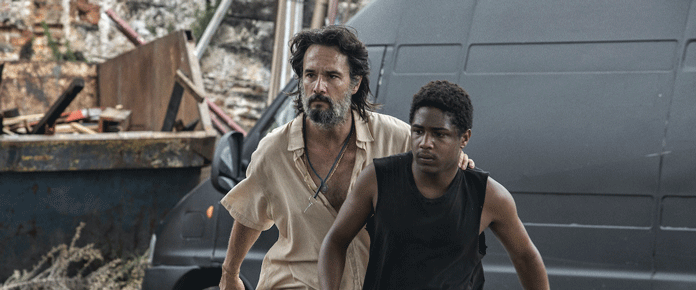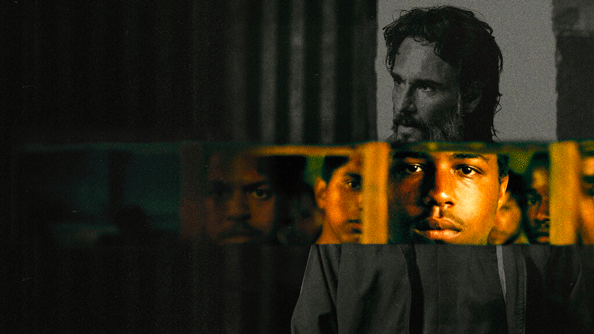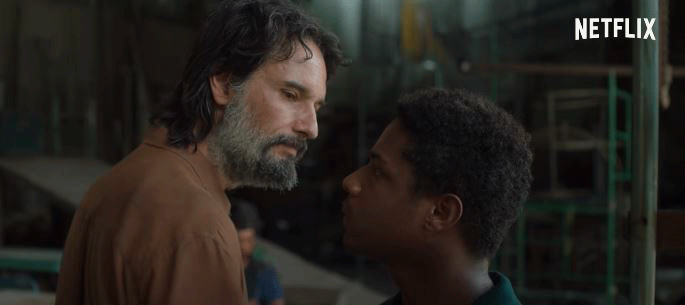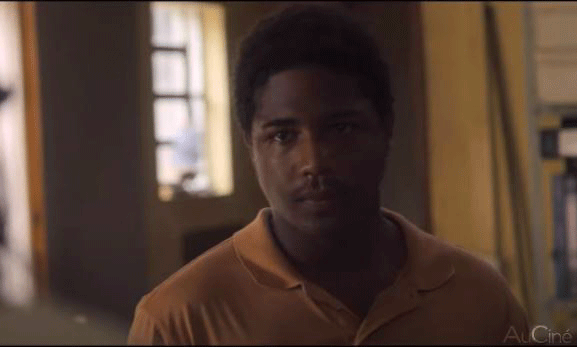Why don’t they just leave? is a question audiences often find themselves asking when they see individuals who are trapped in a horrendous situation. Amidst the audience’s protests, it is easier said than done.
Along these lines, the Brazilian Netflix film 7 Prisoners (2021) deals with the push-and-pull of being a captive in modern world enslavement as it follows four men who were promised a good paying job so they can provide for their families. However, when things start to go south, seeing the world through rose-tinted glasses starts to wear out.

Poverty and unemployment drives individuals to these inhumane practices. The United Nations Sustainable Development Goal on Decent Work and Economic Growth informs us that during the pandemic, 1.6 billion workers in the informal economy risk losing their livelihoods.
The story starts with a too-good-to-be-true promise. A young provincial farm boy, Mateus, can finally improve his family’s socio-economic status by working at a junkyard in the city that pays well. At first, his agent gave a signing bonus to Mateus' family which they received happily. He met four other boys in the junkyard where they were warmly welcomed by their boss, Luca. Nothing could go wrong, right?

Wrong. After a few days of hard labour in the excruciating sun, it turns out they were not getting paid anything, but were tricked into working for Luca. After confronting Luca, it turns out that the signing bonus, the sleeping quarters, and food were not free at all, and they had to repay it with their labour. The workers were forced to submit against their will, and were deliberately coerced in inhumane conditions and brutal intimidation.
The most educated of them, Mateus, devised a contract to free them from Luca´s grasp through paying their debts via their service. After six months of unpaid labor, they are free to go — at least that is what they thought.
As the story progresses, Mateus earned Luca’s trust and started to micromanage the rest of the group. He convinced the rest to take this as good news, so he can watch over them instead of Luca.
Luca sees himself in Mateus and starts treating him as his protégé. Mateus was introduced to Luca’s lifestyle — the women, the booze, the connections. He also learned Luca’s back story, which tells of a nobody just like him who clawed his way up the ladder.

This story did not come from the fictive imagination of the screenwriters. Rather, it is inspired by reality and rampant economic disparity. Many people, especially in third world countries, are continuously exploited for labour. An estimated 24.9 million victims are trapped in modern-day slavery. Of these, 16 million (64%) were exploited for labour, 4.8 million (19%) were sexually exploited, and 4.1 million (17%) were exploited in state-imposed forced labour.
The sinister truth is that this occurrence does not stop with Luca. It is part of an elaborate scheme in which the police and some politicians are also involved, as seen in the politician’s party. Luca is simply a placeholder in this hierarchy, which can be replaced by anyone, anytime. In short, defeating Luca will only provide a short-term solution to their problem, but it will not stop the pervasive human trafficking problem.

There were several instances wherein Mateus had the opportunity to kill Luca, but he honoured their agreement and decided against it. Mateus’ tale provides the perfect metaphor for class traitorship. As he was able to assimilate with Luca’s peers, he started to identify with them more, rather than with the other prisoners. He tends to forget that he has more similarities with the prisoners than with Luca. In the end, he betrays the other prisoners, ultimately leaving them behind to continue suffering.
Circling back to the question “Why won’t they just leave?” It is evident that even if the prisoners want to, they simply cannot, because their lives and families are under threat. Sadly, there are no other opportunities to which they can cling in order to provide for their families.
Ultimately, the question needs to be shifted from asking the victims why it is their responsibility to fight against their oppression to questioning why certain oppressive structures are devised to take advantage of the vulnerable.
You can watch 7 Prisoners on Netflix.
